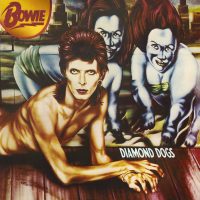 Written by: David Bowie
Written by: David Bowie
Recorded: January 1974
Producers: David Bowie
Engineer: Keith Harwood
Released: 24 May 1974
Available on:
Diamond Dogs
David Live
Cracked Actor (Live Los Angeles ’74)
Personnel
David Bowie: vocals, guitar, saxophone, Mellotron, Moog synthesizerMike Garson: piano
Herbie Flowers: bass guitar
Tony Newman: drums
The centrepiece of David Bowie’s Diamond Dogs was the triple-song suite ‘Sweet Thing’/‘Candidate’/‘Sweet Thing (Reprise)’. Filled with drama and pathos, it remains one of Bowie’s most remarkable recordings.
Although all three songs were conceived as one, they were listed separately on the Diamond Dogs album cover. The first time they were listed as one was when Bowie included them on the iSelect compilation in 2008.
The ‘Sweet Thing’ suite contained some of Bowie’s finest singing to date. It showcased his remarkable vocal range, moving effortlessly from the opening low baritone to the high theatrics of “Will you see that I’m scared and I’m lonely?”
The lead guitar was performed by Bowie, who spent a number of weeks improving his playing skills before recording the album. Having dispensed with the Spiders From Mars after Pin Ups, he was unable to fall back on Mick Ronson’s fluid playing and versatile arrangements, but the solo which ends ‘Sweet Thing’ offers proof, were it needed, that Bowie was an adept and note-perfect performer in his own right.
I knew that the guitar playing had to be more than okay. That couple of months I spent putting that album together before I went into the studio was probably the only time in my life where I really buckled down to learn the stuff I needed to have on the album. I’d actually practise two hours a day. I knew the sound in my head, and at that time I didn’t know musicians who could carry it off.
Guitar Player, June 1997
Ava Cherry, who worked with Bowie on the Diamond Dogs/Soul Tour as well as the Young Americans album, and was one of his romantic partners in the mid-Seventies, recorded a version of ‘Sweet Thing’ at Sigma Sound Studios on 9 July 1974.
She was backed by members of Bowie’s touring band. Bowie himself called in at the session, and was impressed enough by the studio to use it for his next album.
The lyrics
Bowie’s lyric sheets, with various revisions, were given to Jon Astley, who was working at Olympic Studios in Barnes, London, when Bowie was recording the album. Bowie agreed to give Astley the papers on the condition that he stayed late that night to engineer a saxophone overdub and mixing session for Lulu’s version of ‘The Man Who Sold The World’.
The papers were sold at Christie’s auction house in London in June 2011 for £8,750.
Although Bowie continued rewriting the words for the medley until the final vocals were laid down, those for the opening ‘Sweet Thing’ were largely in place from the beginning. Only a handful of lines – “Will I be big” and “’Cause the fake is a true that it rots all your structure away/Like the street fleet who whisper” – were excised.
Bowie used William Burroughs’ cut-up technique to allow new meanings to emerge from his words. Not all were meant to be readily understood, and it remains likely that a couplet such as “If this trade is a curse, then I’ll bless you/And turn to the crossroads, and hamburgers” was meant to defy interpretation.
Other meanings were more readily understood. ‘Sweet Thing’ is Bowie at his sleaziest, a song about transactional, loveless sex with the impassive protagonist “putting pain in a stranger”, and willing to “wrangle some screams from the dawn”.
Bowie explained the thinking behind the songs in his liner notes for iSelect, when it was given away with copies of the Mail on Sunday.
I’d failed to obtain the theatrical rights from George Orwell’s widow for the book 1984 and having written three or more songs for it already, I did a fast about-face and recobbled the idea into Diamond Dogs: teen punks on rusty skates living on the roofs of the dystopian Hunger City; a post-apocalyptic landscape.A centrepiece for this would-be stage production was to be Sweet Thing/Candidate/Sweet Thing, which I wrote using William Burroughs’s cut-up method.
You write down a paragraph or two describing several different subjects creating a kind of story ingredients-list, I suppose, and then cut the sentences into four or five-word sections; mix ’em up and reconnect them.
You can get some pretty interesting idea combinations like this. You can use them as is or, if you have a craven need to not lose control, bounce off these ideas and write whole new sections.
I was looking to create a profligate world that could have been inhabited by characters from Kurt Weill or John Rechy – that sort of atmosphere. A bridge between Enid Blyton’s Beckenham and The Velvet Underground’s New York. Without Noddy, though.
I thought it evocative to wander between the melodramatic Sweet Thing croon into the dirty sound of Candidate and back again. For no clear reason (what’s new?) I stopped singing this song around the mid-Seventies.
Though I’ve never had the patience or discipline to get down to finishing a musical theatre idea other than the rock shows I’m known for, I know what I’d try to produce if I did.
I’ve never been keen on traditional musicals. I find it awfully hard to suspend my disbelief when dialogue is suddenly song. I suppose one of the few people who can make this work is Stephen Sondheim with works such as Assassins.
I much prefer through-sung pieces where there is little if any dialogue at all. Sweeney Todd is a good example, of course. Peter Grimes and The Turn Of The Screw, both operas by Benjamin Britten, and The Rise And Fall Of The City Of Mahagonny by Weill. How fantastic to be able to create something like that.
Mail Online, 28 June 2008




